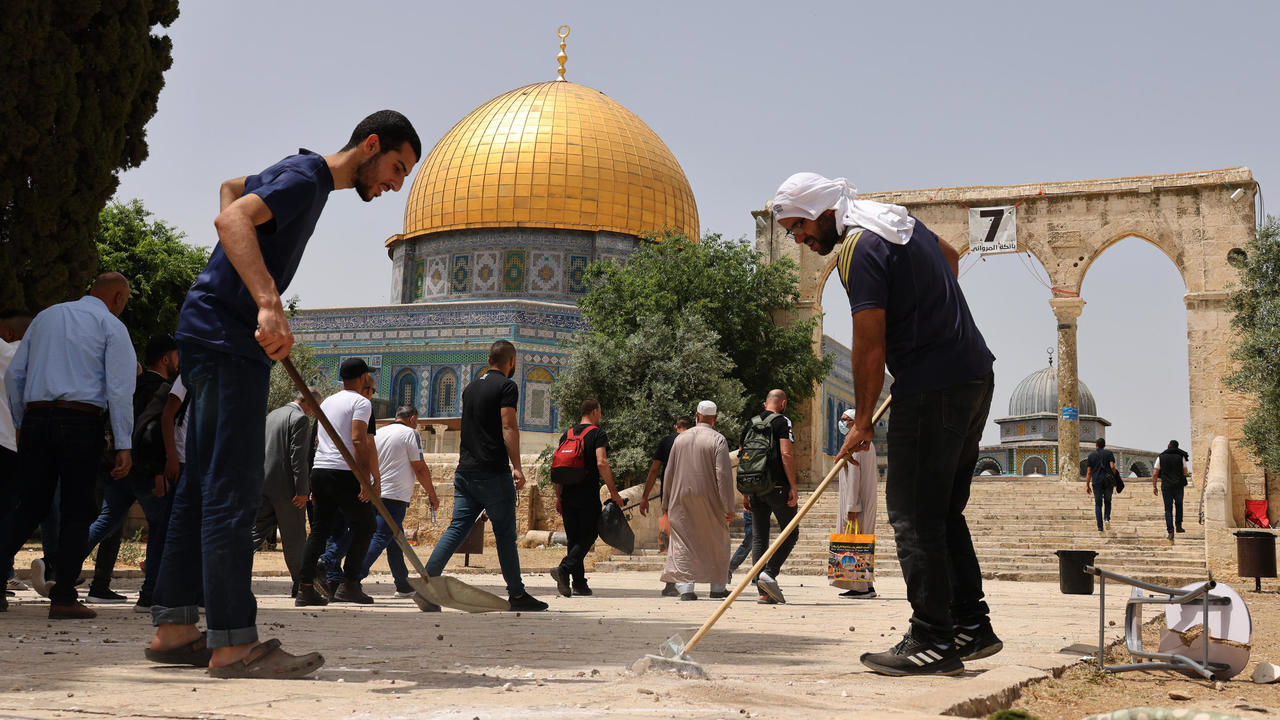
Arab countries that have normalised or eased relations with Israel have been uncomfortably witnessing the new escalation of tensions between Israel and the Palestinians, which began last week. Given the situation, their diplomatic strategies have come under fire from many quarters. Karim Sader, a political scientist specialising in the Gulf countries, explains.
Advertising Read more
With the risk of a conflagration in the Middle East, where tension is not subsiding in Israel and the Palestinian territories, calls for calm from the international community have multiplied in recent days. But for now, they have had no effect on the escalation of violence.
While the US and European countries were swift to express dismay over this outbreak of violence after several days of clashes in the Al-Aqsa mosque compound in Jerusalem, the reactions of Arab diplomats have come under scrutiny.
Specifically, observers are watching the responses from those nations that have recently normalised relations with Israel, such as Sudan, Morocco, the United Arab Emirates and Bahrain – a rapprochement which, when it happened, provoked shock in the Arab world.
Understandably, Arab countries are uncomfortable with the images of clashes coming from the Al-Aqsa plaza, the holiest place for Jews and the location of the the Al-Aqsa mosque, the third holiest site for Muslims after Mecca and the Prophet’s mosque in Medina, Saudi Arabia.
The Emirates and Bahrain condemned the May 7 raid by Israeli security forces on the mosque and the crackdown on worshippers. Abu Dhabi also called on Israeli authorities to “take responsibility for a de-escalation” of violence.
Morocco, for its part, said it was following developments with “deep concern”, adding that King Mohammed VI considered “these violations inadmissible and fueling tensions”.
Saudi Arabia, which has not yet normalised relations but has given its Gulf allies the green light to move closer to the Jewish state, rejected “Israel’s strategy of evicting dozens of Palestinians from their homes”, referring to the threat of expulsion of Palestinian families from the Sheikh Jarrah neighbourhood in East Jerusalem, which sparked the outbreak of violence.
These reactions were moderate in comparison to those of Iran and Turkish President Recep Tayyip Erdogan, who said he would do “everything he can to mobilize the world, especially the Muslim world, to put an end to terrorism and the Israeli occupation”.
Public opinion sympathetic to Palestinians
For Karim Sader, a political scientist and consultant specialising in the Gulf countries, the countries that have initiated a rapprochement with Israel are under fire because of the strong emotions triggered by the violence on the mosque plaza. These nations are equally uncomfortable because the escalation of violence has put the Israeli-Palestinian conflict back on the regional agenda.
“By going through a period of tension and escalation in recent days, the Israeli-Palestinian issue, which has been low on the list of diplomatic priorities of the Gulf countries for several years, has once again become an embarrassing element for those involved in this process,” he told FRANCE 24.
“And when a holy place of Islam is at the heart of tensions, these countries are forced to react, but in terms that, because of their diplomatic approach, do not have the same rhetoric, nor the same weight as those of non-Arab powers, namely Turkey and Iran, which are at the forefront of reviving the Palestinian cause,” he added.
According to Sader, the protests that took place in Morocco and other countries and the discontent that can be perceived in the Gulf societies, “not in the street because of the closure of the political space but on social networks”, remind concerned Arab leaders “that the issue of the fate and rights of the Palestinians is still not resolved and that the public opinion is still sympathetic to [the Palestinians]”.
“This mobilisation and this anger are also proof of the fragility of the reconciliation processes and, by extension, proof that there is unlikely to be a peace agreement as long as the Israeli-Palestinian conflict persists,” he said.
“The 2002 Arab peace initiative, rejected by Israel, invariably linked the resolution of this conflict to coexistence between the peoples and a peace agreement. The Abraham Accords [the 2020 joint statement between Israel, the US and the UAE], on the other hand, sought to bypass these issues, with the ambition, and to some extent the naivety, of achieving political rapprochement with Israel without taking into consideration the Palestinian question.”
The 2002 initiative, which was endorsed by the Arab League at the Beirut Summit, proposed a peace that went so far as to envisage normalised relations with Israel. That was in exchange for the formation of an independent Palestinian state with East Jerusalem as its capital and a “just solution” to the question of Palestinian refugees.
Saudis ‘ready to reconsider’?
On a security level, Sader said, because of the deterioration of the situation in the region, the countries that are most committed to the normalisation process – as evidenced by sending an ambassador to Israel, as the United Arab Emirates did – find themselves “hostage to the Israeli-Palestinian conflict and its upheavals”, in the sense that “Israeli nationals and interests in the countries concerned are becoming potential targets for acts of retaliation”.
Nevertheless, unless there is a fatal escalation that jeopardizes the balance in the holy sites of Jerusalem, the situation is not likely to interrupt the existing rapprochement processes, experts say. That is particularly true for Qatar. On the other hand, these events “are likely to push some regional players, such as the Saudis, to reconsider their thinking”.
“The Emirates are certainly in an uncomfortable position today, but they can lie low because, unlike Saudi Arabia, guardian of the holy places of Islam, their role has a less symbolic scope in the region and because they have a certain flexibility in terms of diplomacy,” Sader said.
“This situation could, however, make the Saudi Crown Prince, Mohammed Bin Salman, who has so far agreed to follow the advice of his father, reconsider his own stance,” Sader continued. “The king has been advising his son not to rush into an official honeymoon with the government of Israeli Prime Minister Benjamin Netanyahu, which has engaged in a tacit détente with the kingdom. The crown prince has the latitude to decide not to follow the same path as his neighbours, as doing so could backfire on him.”
This article was translated from the original in French
Daily newsletterReceive essential international news every morning Subscribe






